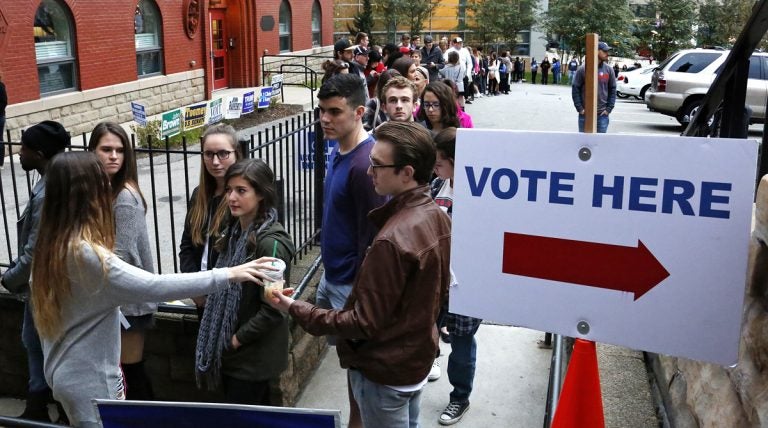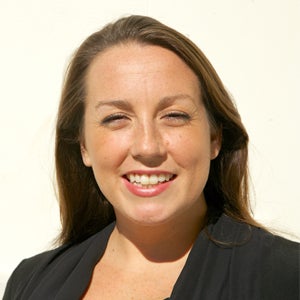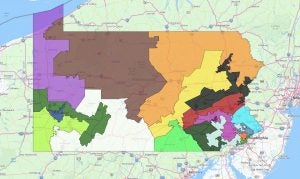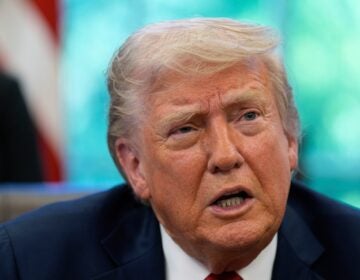Pennsylvania voters testify in gerrymandering trial in federal court
Seven voters named as plaintiffs in the case testified that they believe their vote doesn’t count.

Duquesne University students wait to cast their votes in Pittsburgh during the 2016 Election. (AP Photo/Gene J. Puskar)
On the second day of trial in a federal case over partisan gerrymandering and the constitutionality of Pennsylvania’s congressional district map, eight voters named as plaintiffs in the case testified that they believe their vote doesn’t count.
They’re calling for a new map in time for the 2018 midterm election, when all 18 of Pennsylvania’s congressional seats are up for grabs.
Louis Agre, 63, a leader in Philadelphia’s Democratic party, complained that elections aren’t competitive enough in the 2nd congressional district.
In the last congressional election in 2016, U.S. Rep. Dwight Evans (PA-2) defeated Republican challenger James Jones with more than 90 percent of the vote.
“Our votes are watered down by living in such a highly concentrated district,” said Agre.
Agre, a labor lawyer, testified that there are too many Democrats in the district, which he believes leads to uncompetitive elections and candidates who cater to voters on the far left of the party rather than those in the middle with more moderate views.
“We need competitive districts so we can come to the middle, so we can solve problems in this country,” said Agre.
Jean Shenk, a Democrat who lives in Bethlehem, said the Lehigh Valley should be kept whole when it comes to the state’s congressional map.
She resides in the 15th district, which includes Bethlehem and Allentown, but not Easton in the Lehigh Valley, and then extends to south central Pennsylvania — approaching Harrisburg and avoiding the city of Lebanon.
Shenk’s greatest concern is health care.
She testified that she has Marfan syndrome, a genetic disorder that affects her connective tissue, and is unable to work at this time due to her condition. Currently covered by COBRA, she fears her health insurance will run out and her options for another health plan will be limited.
Even though Republican U.S. Rep. Charlie Dent (PA-15) voted “no” on the health care replacement bill in the house, Shenk said that her views and values don’t align with the congressman and other constituents outside of the Lehigh Valley.
“This map makes my vote a waste,” said Shenk. “This map has loaded Pennsylvania … with Republicans, affecting votes in Washington. I worry daily about these votes because of my health condition.”
Dent, considered a moderate Republican in Washington, plans to retire and will not run for re-election in 2018 in part because what he describes as increased polarization in the capitol.
Brian Burychka, 44, a high school history teacher, grew up in Boyertown, but currently resides in Conshohocken — which sits in Pennsylvania’s 13th district, represented by Democrat Brendan Boyle.
Burychka says his views as a moderate Democrat and avid hunter are lost in the district, especially when it comes to the gun control debate.
“I’m not getting the same one vote as someone in a competitive district,” said Burychka.
Boyle ran unopposed in the last congressional election in 2016.
During cross examination, Burychka and other plaintiffs who testified said part of the impetus for their recent engagement in politics and concern over partisan gerrymandering was spurred by the election of President Donald Trump.
Also during cross examination, defense attorney Kathleen Gallagher, who represents House Speaker Michael Turzai (R-Allegheny), asked nearly all of the plaintiffs if they had ever been prevented or prohibited from voting in any election.
Each witness responded, “No.”
Expert testimony
The defense called their first witness in the case, Princeton University professor Nolan McCarty.
McCarty, who studies politics and legislative polarization in the U.S., testified that Pennsylvania Democrats have a reasonable probability of winning 8 out of the state’s 18 congressional seats.
He attributed the last three election cycle outcomes, where Democrats won five seats, to underperformance by the party.
McCarty specifically challenged the conclusions of the plaintiffs’ first expert witness, Daniel McGlone, who was used on Monday to support the claim that Pennsylvania’s map is “voter proof.”
“Elections are determined not just by the underlying partisanship, but on the candidates that choose to run,” said McCarty.
Anne Hanna, an expert witness in engineering and data analytics for the plaintiffs, also testified before the three-judge panel.
Her testimony began Monday and continued Tuesday morning with many rough starts and stops during her testimony.
At one point, Chief Judge D. Brooks Smith sternly told Hanna to answer the question that she was asked and at several points warned plaintiffs’ attorney Brian Gordon that he was wasting time.
Eventually, Gordon asked Hanna if it was feasible to draw politically neutral maps.
She responded: yes.
Hanna then compared the 2011 congressional district map to archival maps from 1972 and from 1992. She said the older maps were made to be reasonably compact, contiguous, and to preserve communities of interest.
She outlined five potential guidelines for following those principles without using partisan data and testified that it would be possible to create an algorithm that achieves that result.
In cross examination, defense attorney Jason Torchinsky pointed out that Hanna’s guidelines make no mention of the Voting Rights Act, a federal requirement in redistricting, and do not take incumbency into consideration.
On Wednesday, plaintiffs’ attorneys plan to call State Sen. Andrew Dinniman (D-Chester) to testify along with more Pennsylvania voters.
Plaintiffs’ attorneys clarified that the testimony of State Sen. Daylin Leach (D-Montgomery), State. Rep. Greg Vitali (D-Delaware), former Republican legislative staffer Erik Arneson, and Republican district director Bill Schaller will be entered into the record through their deposition transcripts.
House Speaker Turzai and Senate President Pro Tempore Joe Scarnati (R-Jefferson) were also deposed in the case. Their testimony is currently under seal and being disputed by Plaintiffs’ attorneys for violating a court order. The three-judge panel is still considering the objections.
Defense attorneys said they expect one other expert witness to testify.
Correction: A previous version of this article stated that seven voters testified on Tuesday.
WHYY is your source for fact-based, in-depth journalism and information. As a nonprofit organization, we rely on financial support from readers like you. Please give today.







